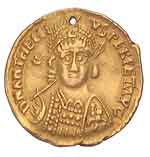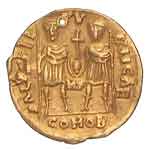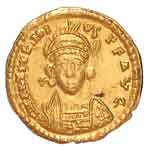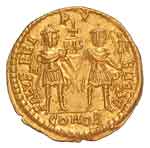 ANTHEMIUS: MILAN
ANTHEMIUS: MILAN
PRELIMINARY ANALYSIS
= - no variation from standard type listed above
" - same as previous
type
MD / COMOB = MD
COMOB
Spec. =
number of specimens catalogued
fn - footnote in RIC
SERIES 3: cuirassed bust (KFa3)1 / PAX in wreath
Obv Rev Spec. RIC Obv
Rev
(PV // M | | D /
COMOB)
1 1 2 2884 DNANTHEMI-V-SPFAVG2 PAS
2 2 1 2885 DNANTHEM-IVS-PFAVG "
2 3 4 2885 "
SALVBREI3 // bAS
3 3 8 2884 DNANTHEMI-VS-PFAVG "
4 3 1 2884 DNANTHEMI-VSPFAVG "
5 3 1 2886 DNANTHE-MIV-SPFAVG "
SERIES 4: cuirassed bust (KFa3) / globus
cruciger
Obv
Rev
Spec.
RIC
Obv
Rev
(PV // MD / COMOB)
5 4 2 2887 "
=
6 4 1 2888 DNANTHEMIV-S-PEAVG =
7 4 3 2890 DNANTHEMI-VSPERPETAVG =
7 5 1 2890 "
=
8 5 7 2890 DNANTHEMI-VSPERPETAVC =
8 6 1 2890 "
=
8 7 1 2890 " 
8 8 3 2890fn "  ALV
ALV REI
// MD
REI
// MD
8 9 1 2892 "
SALVREI
// CO OB
OB
9 10 1 2890 DNANTHEMI-VSPERPETAVG =
10 10 1 2891 DNANTHEMI-VSPERPET VG =
VG =
10 11 3 2891 "
=
10 12 4 2891 "
MB4
11 12 4 2889 DNANTHE-MIVSPFAVG =
10 13 3 2893 DNANTHEMI-VSPERPET VG
VG 
10 8 1 2890fn "  ALV
ALV REI / MD
REI / MD
SERIES 5A: draped bust (MF3) / globus cruciger
Obv Rev Spec. RIC Obv
Rev
(PV //  / COMOB)
/ COMOB)
12 14 1 2894 DNANTEHEMIV-SPERPETVAVC =
13 14 1 2895 DNANTHE-MIVSPFAVC =
14 15 1 2896 DNANTHEMI-VSPEAVG MD
SERIES 5B: draped bust (MF3), new engravers / globus
cruciger
Obv Rev Spec. RIC Obv
Rev
(IP //  / COMOB)
/ COMOB)
15 16 3 2897 DNANTHEM-IVSPEAVG MD
16 17 4 2898 DNANTHE-MIVSPEAVG =
17 17 2 2899 DNANTHEM-IVSPEAVG =
18 18 3 2899 "
=
TOTAL
69 specimens
NOTES
1 On
obv. 1-6 the diadem has no jewel or trefoil. It has no trefoil on 10 and 12.
2
Obverse die link with Rome 2804.
3 Second ‘S’ of ‘SALVS’ engraved over mistaken first stroke of ‘R’.
4 There
is no evidence for this mintmark’s having been recut from an RM (see comments
in DO cat. 913), but its appearance is peculiar. The die was certainly cut by a Milan engraver.
General Introduction Introduction Rome Ravenna
 COMMENTARY
COMMENTARY
The minting practices at Milan in series four need some explanation. There are clear links between obverses from 2-2 (series three) to 8-9 (series four). The chronological order of 8-6 to 8-9 is determined by a growing and changing die flaw on the obverse at the second ‘P’ of ‘PERP’. Rev 5 was particularly long-lived and it was during the use of this reverse that the obverse flaw first develops: it is not present on the first two specimens but is on the last four. However, it does not exist on 8-6. Since rev 5 links back to obv 7, the only conclusion is that both rev 5 and rev 6 were employed simultaneously with obv 8, with rev 6 being introduced at the same time as the shift from obv 7 to 8. The obverse flaw and further die wear make it certain that rev 8 belongs at the end of obv 8’s lifetime. Therefore there is a definite chronological progression from 2-2 to 8-9. There is then a break, though this gap may later be filled by further specimens.
The chronological progression of obv 10 is also made certain by a growing die crack across the last three letters of ‘ANTHEMI’. It beings between the ‘M’ and ‘I’ and then eventually extends all the way across the letters to the edge of the die. It first appears in the sequence 10-12 and progresses steadily in length and depth (thus as a raised line on the coins themselves) to the last pair in the sequence, 10-8. But this produces a strange paradox since rev 8 links to the end of the life of obv 8 as well as the end of the life of obv 10. It is impossible to link the two sequences of 2-2 to 8-9 and 9-10 to 10-8 through rev 8. The only plausible explanation is that after a lull in minting at the end of series four, new solidi were called for and instead of engraving new dies (or while waiting for new series five dies to be completed) the mint workers simply employed the most recent obv die (in spite of a large crack) and called an old reverse back into service. Rev 8 as paired with obv 10 shows some signs of wear in the device and COMOB, but no other obvious damage, so perhaps that was why it was reused.
The other major anomaly is that obv 11 links with rev
12, yet the growing flaw in obv 10 proves that rev 12 must link into the middle
of the life of obv 10, not at its end.
There are four specimens of rev 12 with obv 10 and four with obv
11. Each shows advancing or
advanced die damage at the ‘BL’ of ‘BLICAE’ in a sequence that makes it certain
that both obverses were used at the same time with this single reverse
die. Obv 11 is unusual in that it
foreshadows the legend change in series five (obv 13) and does not include
PERPETV. Since obv 9 links with rev 10, 9-10 therefore begin
this final sequence of series four.
General Introduction Introduction Rome Ravenna
CONCORDANCES
D = Georges Depeyrot, Les Monnaies d’or de
Constantin II à Zenon (337-491)
(Wetteren, 1996), pp. 175-6 and plate 14.
DO = Philip Grierson and Melinda Mays, Catalogue
of Late Roman Coins in the Dumbarton Oaks Collection and in the Whittemore Collection. From Arcadius and Honorius to the
Accession of Anastasius (Washington,
DC, 1992).
F = Joan M. Fagerlie, Late Roman and Byzantine
Solidi Found in Sweden and Denmark
(NNM 157; New York, 1967).
L = Guy Lacam, La fin de l’Empire romain et le
monnayage or en Italie, 455-493,
vol. I (Lucerne, 1993), pp. 475-487 (plates CXXI-CXXVI-B) and vol. 2, plates
28-9. Note that no. 92 belongs to
the mint of Rome.
UB = Oscar Ulrich-Bansa, Moneta Mediolanensis
(352-498) (Venice, 1949).
V = Lucrezia Ungaro, ‘Il Ripostiglio della casa delle
Vestali, Roma 1899’, Bollettino di Numismatica 4 (1985), 47-160.
1-1 L
76, V 12 = L 77
2-2 RIC 2885 plate
2-3 UB
127 = DO 906 = L 79, D 31/2, V 11
3-3 L
81, L 82, L 83, F 153, UB 126, DO
905, RIC 2884 plate (BM)
4-3 UB
126*= DO 904 = L 78
5-3 UB
128 = DO 907 = L 80 = RIC 2886
plate
5-4 UB
124
6-4 UB
125
7-4 F
149, L 103, D 29/1
7-5 L
102
8-5 L
104, L 109, DO 910 = L 108, V 13, RIC 2890 plate (BM)
8-6 UB
121 = L 100 (Turin, not Bologne)
8-7 DO
912 = L 107
8-8 UB
123 = DO 911 = L 105, F 151, V 14
8-9 DO
909 = L 106 = RIC 2892 plate
9-10 L
101
10-10 RIC 2891 plate
10-11
10-12 UB
121* = DO 913 = L 98, L 99
11-12 UB
124* = L 93, DO 914 = L 97, RIC
2889 plate
10-13 UB
122 = L 94 = RIC 2893 plate (BM),
L 95, F 152 = L 96
10-8
12-14 UB
120 = L 84 = RIC 2894 plate
13-14 L
86 = D 30/1 = RIC 2895 plate
14-15 UB
119 = L 85
15-16 UB
117, RIC 2897 plate
16-17 F
155, L 87, DO 921 = L 91, RIC
2898 plate
17-17 UB
118, F 154 = RIC 2899 plate
18-18 DO
922 = L 88, L 89, L 90
Georges Depeyrot, Les Monnaies d’or de Constantin
II à Zenon (337-491) (Wetteren,
1996), pp. 175-6 and plate 14.
29/1 Obvv.
7-10 and associated reverses (photo is 7-4)
29/2 Does
not exist; probably14-15 misdescribed
29/3 11-12
29/4 5-4
29/5 Does
not exist; probably 6-4 misdescribed
30/1 Does
not exist; misdescribed 16-17 (yet photo is 13-14)
30/2 Does
not exist; 15-16, 17-17, 18-18 misdescribed
30/3 Does
not exist; 12-14 misdescribed
30/4 Does
not exist; 14-15 misdescribed
31/1 1-1,
3-3, 4-3 (though the reverse is not PAX)
31/2 2-2,
2-3 (though the reverse is not PAX)